After October 7, Australia is not the same country
Since the October 7 attacks, Australian values have been traduced. What is happening affects the entire country and the collective impact is profound.
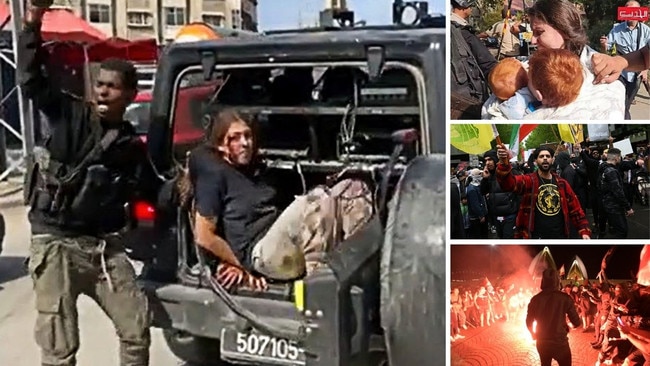
Australia is not the same country it was before October 7. The changes that have taken place are not easy to quantify. They should be neither exaggerated nor ignored.
But they are real and threaten to be lasting. For many Jewish Australians they are traumatic. But this issue is not just about Jewish people. The Australian values of multiculturalism, mutual respect, truth and social order are being traduced.
What is happening affects the entire country.
The collective impact is profound. Anthony Albanese and Peter Dutton are divided over core values and how to respond to anti-Semitism; the Labor-Coalition foreign policy rupture is deep given Labor’s re-alignment against Israel. University leaders have largely failed to honour their mission and safeguard Jewish students; many cultural institutions have tolerated artistic expression turning into political activism; the Greens political party has promoted anti-Semitism in its anti-Israeli, pro-Palestinian ideological branding; the Australian Human Rights Commission has betrayed its responsibilities; and the evidence points to Australia now having a home-grown political extremist problem.
The nation suffers from polarisation yet also denial. Anti-Semitism is haunting the country while various pro-Palestinians mount a variety of demands for peace, a rejection of Israeli war policy, an end to Israel’s existence and support for terrorism in this cause. The left of politics has been radicalised by the conflict while Muslim groups prepare to run their own candidates at the federal election against sitting Labor MPs.
At the centre of the maelstrom is the Albanese government. It has struggled unsuccessfully for a year trying to contain the domestic divisions, yet judgment cannot be avoided: Labor has failed to show the moral, social and strategic leadership that Australians deserve. Labor seems unable to comprehend the stakes involved in the post-October 7 legacy. This legacy is about fundamental Australian values and core foreign policy beliefs. It is guaranteed to spill into the coming election campaign.
The Opposition Leader has launched a values-based mission – he defines the Coalition as standing with Israel and taking resolute action against anti-Semitism while the Prime Minister has been twisting and turning, the upshot being he satisfies neither Jewish Australians nor the pro-Palestinian movement and looks an unconvincing leader.
The risk for Labor is that October 7 legacy is only growing and cutting Dutton’s way in electoral terms. This invites parallels with the voice where Labor lost the support of mainstream Australians.
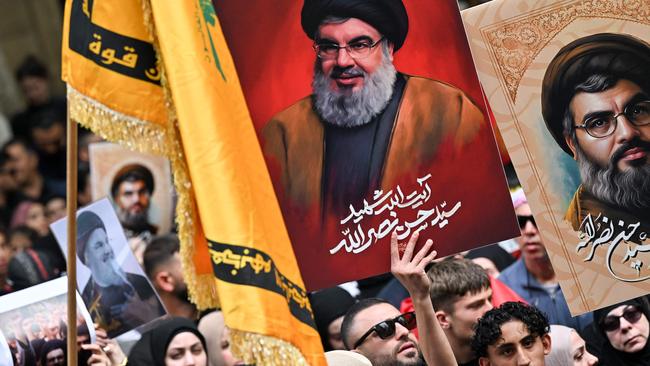
It is impossible to review these events without reflecting on the character of the Labor Party and its internal transformation.
Labor cannot respond from conviction, it criticises anti-Semitism but it is dependent on the Palestinian vote; it supports Israel’s right to defend itself but refuses to support its military retaliation against Hezbollah; it is appalled by the military tactics and Palestinian slaughter perpetrated by the Netanyahu government but has been totally ineffectual in addressing the threat posed by Hamas and Hezbollah – the provocateurs who have triggered Israel’s military resort.
Penny Wong’s foreign policy wins the applause of the multilateral peace lobby but is near useless as a tool of realism in a world driven by power, military force and escalating rivalry.
Albanese’s problem is that the Middle East crisis now runs like an electric current through Australia’s life, notably in Sydney and Melbourne. Anti-Semitism exists in parallel with hostility towards Israel from much of the Muslim community and support for terrorism from a minority of that community.
The killing of 40,000 people in Gaza and the prospect of many civilian casualties in Lebanon will translate into enduring grievance against Israel and long-run domestic rupture in Australia.
The idea that public commemorations of October 7 will be confronted by pro-Palestinian events and even celebrations of the massacre has been rejected by Albanese, Dutton and NSW Premier Chris Minns. While some events will proceed, the joint statement from Australian Federal Police and state police said “no tolerance” would be extended to illegal behaviour or the display of prohibited symbols.
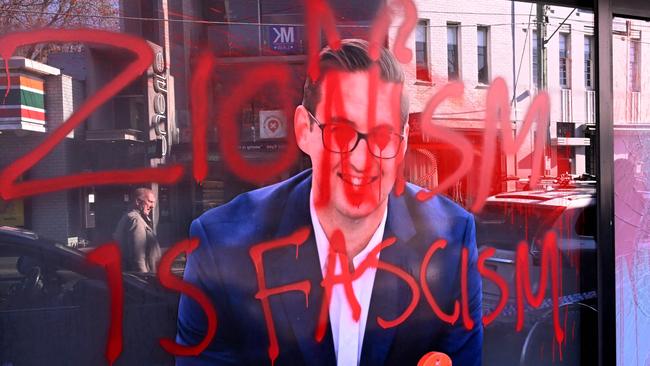
Opposition home affairs spokesman James Paterson said of the pro-Palestinian proposals: “No civilised society allows the celebration of death. They are there to celebrate the anniversary of the largest loss of Jewish life since the Holocaust.”
Albanese struggles with a double dilemma – his inability over the past year to show the leadership required given the rising social divisions and the shift in Australian foreign policy, engineered by Wong, of hostility towards Israel, opposition to any of its military campaigns and an elevated effort to recognise Palestinian statehood. Israel was once an ally of Australia – but the Australia-Israel partnership, once a matter of Labor pride, lies in ruins.
Sadly, the leadership weakness at the apex of the political system has had a corosive impact across the entire country with manifest examples of leadership weakness in many institutions – government, politics, universities, police forces, cultural bodies and media. Rarely have Australian elites looked so devoid of institutional courage and cultural understanding.
Many Australians are astonished at what is happening to their country since October 7. They sense the deeper truth – many of the protests in our cities are not just against Israel but are about Australia and seek to change the norms of our democracy.
With Wong’s recent speech at the UN, our foreign policy shift comes into stronger focus. Wong is long respected for her achievements; her re-alignment against Israel reveals a utopian, gesture-laden but futile stance where Australia declares it wants a two-state solution imposed on the parties, based on a timetable, a stance impractical and dangerous, that seems designed more for appearance than reality and comes when support for the two-state solution from both sides is at rock bottom.
OCTOBER 7: A YEAR ON

Australia is not the same country — but too many are in denial
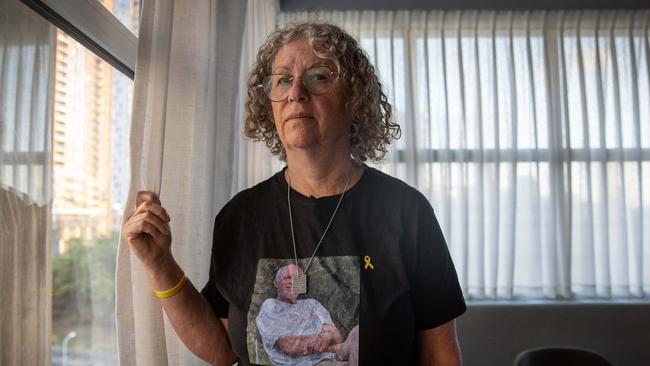
After ‘51 days of hell’, former hostage haunted by fear for husband
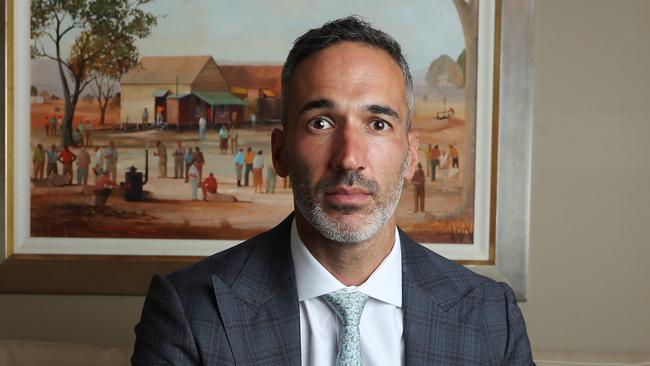
Attacks on Jews at record levels
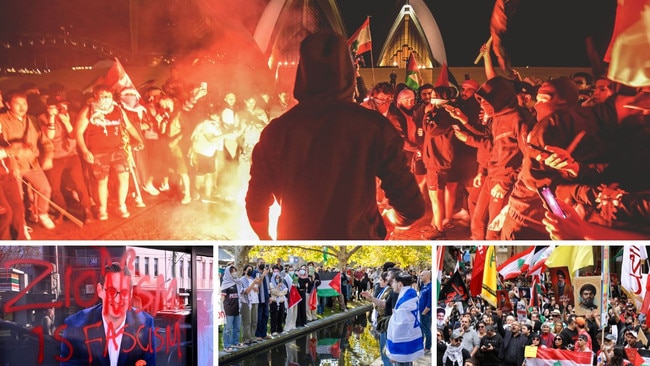
No longer ‘one and free’: Nation torn apart by vile ignorance
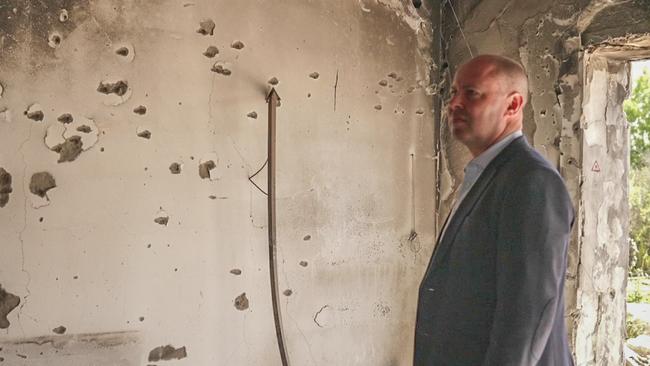
Australia has been weak when we needed to be strong
Labor’s doublespeak and equivocation have made the nation less safe as a result.
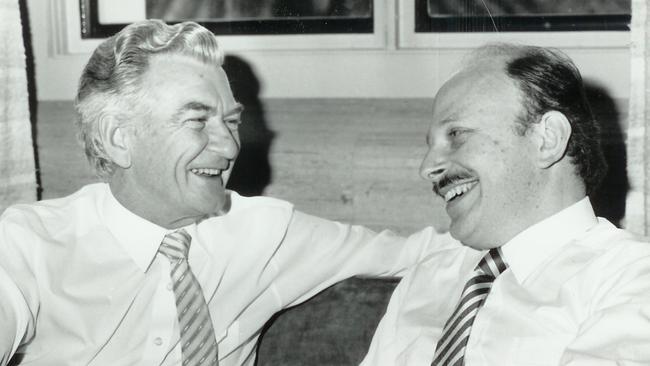
‘Genocide’ the modern-day blood libel to demonise Jews
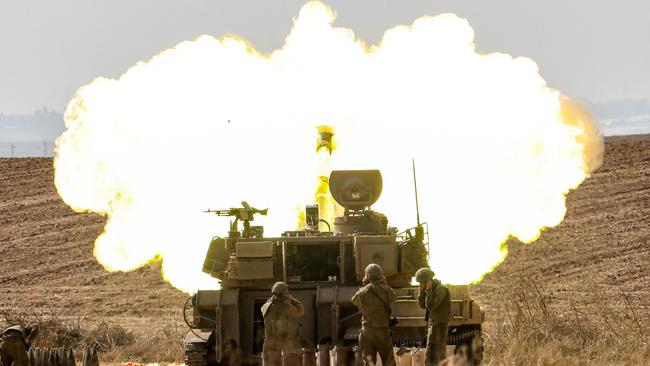
Two enemies, two paths – and one deadly objective
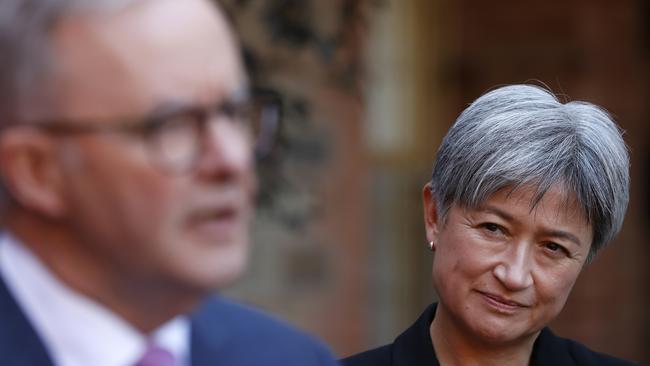
The tweet that captures the cowardice of Labor
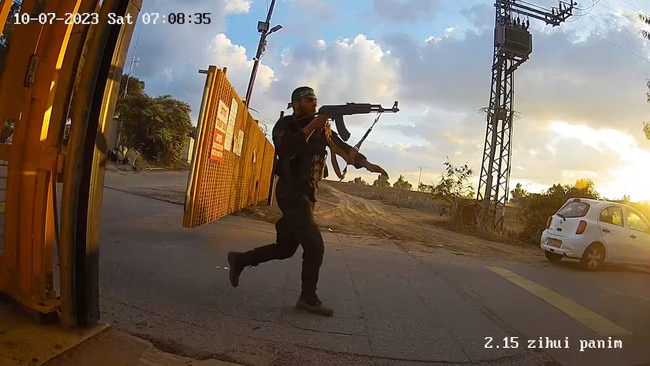
‘They’re here’: a family’s tale of escape as Hamas terrorists attacked
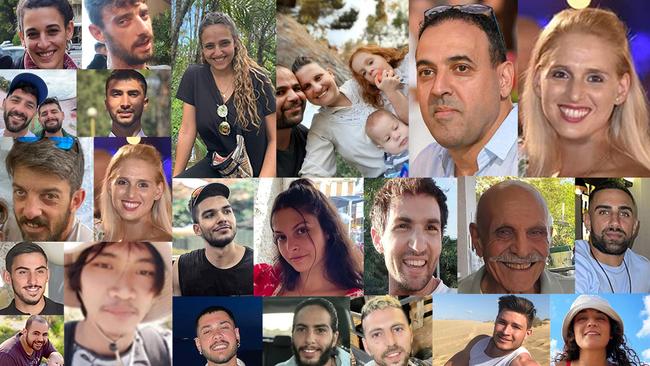
The nagging thought haunting the families of the Hamas hostages
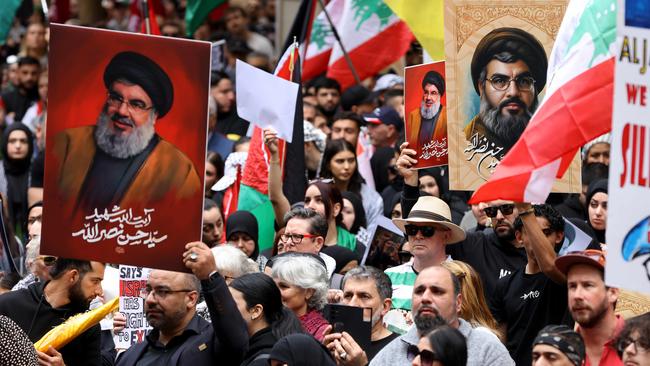
Look around, and you’ll see Hamas’ goals of October 7 fulfilled
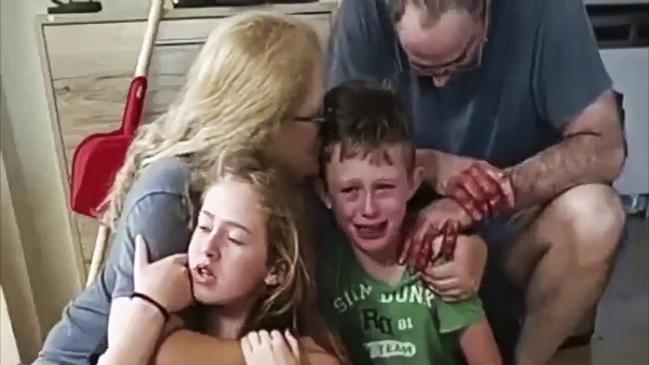
The real-life horror movie our politicians refuse to see
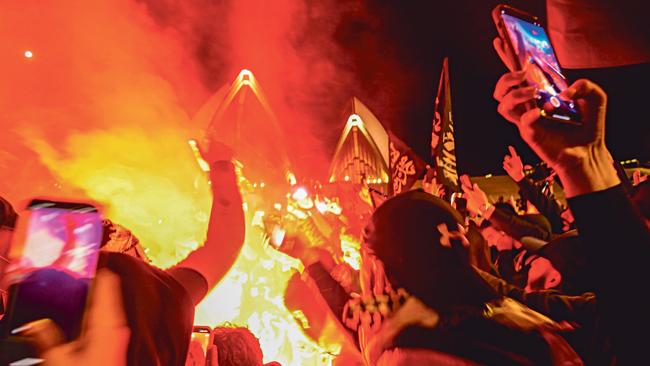
We need to talk about the crisis in Western civilisation
The October 7 pogrom unleashed a wave of sympathy across the West – for the perpetrators.
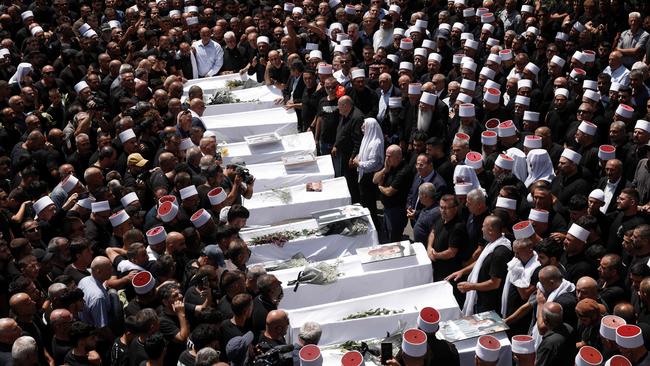
To the political left, some kids matter more than others
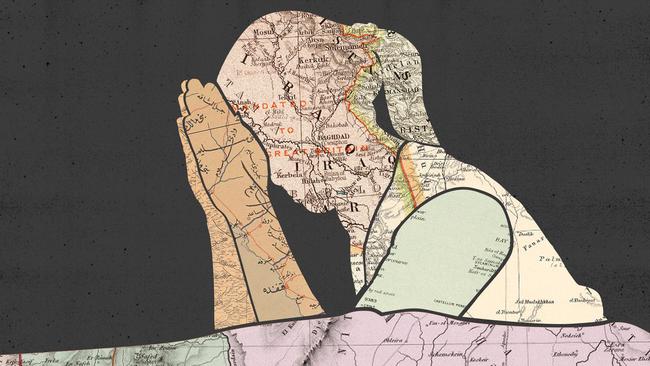
Notes from a long war: Israel one year on from the October 7 massacre

In exile: how Jews became a perpetually persecuted people
Wong talks to a world that doesn’t exist. The real world is dominated by power realities: the global threat of authoritarian powers encompassing Russia, China, Iran and North Korea; the losing struggle by Ukraine to defend itself; China’s assertion; the anti-Israeli imperialism of Iran; and the constant assessment by its enemies of whether the US has the will for effective deterrence.
Labor policy calls for de-escalation and ceasefires, the consequence being restrictions on Israel’s campaign against Hezbollah and Iran and denial of its opportunity to dismantle the infrastructure aligned against it.
Wong’s UN voting stance has been in harmony with many other nations but her strategic shift against Israel is a distinct departure from the position of former ALP leaders from Bob Hawke to Julia Gillard. The extent of Labor’s hostility towards Israel was revealed mid-year when Assistant Foreign Minister Tim Watts, acting on Wong’s instruction, called in the Israeli ambassador, Amir Maimon, to warn against any Israeli military action in Lebanon against Hezbollah. He made clear this would be unacceptable to Australia and would not be supported.
This was a shameful stance, unworthy of Australia, hostile to our history and character. Yet it governs the current Albanese government response to Israel’s campaign against Hezbollah.
At the time, Defence Minister Richard Marles confirmed the message, saying Watts said Israeli military action was “something that we would be deeply concerned about”. Opposition foreign affairs spokesman Simon Birmingham said at the time Australia’s opposition to an Israeli military campaign to defend itself against attack from a terrorist organisation was an “outrageous abandonment of a democratic friend and partner”.
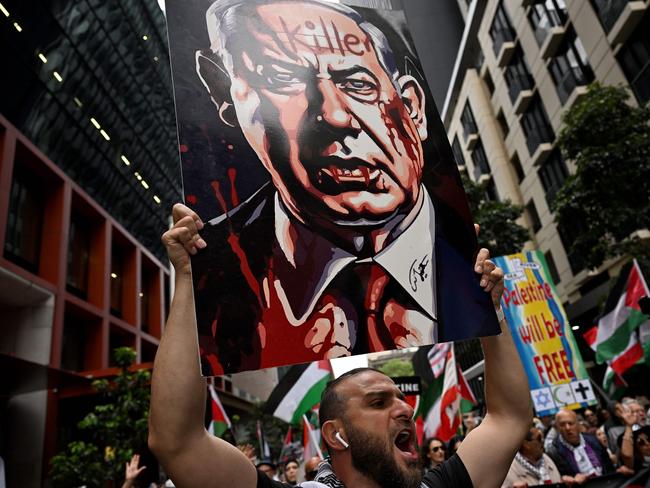
Now the campaign is taking place, neither Albanese nor Wong offers explicit support – unlike the US. They try to cover their opposition with the hollow words that Israel “has the right to defend itself”. Sure, except when it tries. Dutton, unsurprisingly, calls the Wong-Albanese foreign policy “reckless”, the betrayal of an ally, and rejects calls for a ceasefire when Israel is defending itself against enemies.
While the US has long called for a ceasefire and diplomacy, President Joe Biden said Israel had “a right to respond” to Iran’s attack, thereby endorsing in principle Israel’s military retaliation but saying it should be “in proportion”. Biden told the G-7 leaders US support for Israel was “ironclad” and he offered his “full solidarity”. His National Security Adviser, Jake Sullivan, said the US had made clear after Iran’s attack that “there will be consequences – severe consequences – for this attack”.
Earlier US Defence Secretary Lloyd Austin and Israeli Defence Minister Yoav Gallant agreed in their conversation readout “on the necessity of dismantling attack infrastructure along the border to ensure that Lebanese Hezbollah cannot conduct October 7-style attacks on Israel’s northern communities”, with Austin affirming a “diplomatic resolution” was needed to enable Israeli civilians to return to their homes. The defence leaders agreed on “serious consequences” for Iran in the event it launched a direct attack on Israel – which is what happened. Nobody would expect Australia to duplicate America’s position. But the tortuous rhetoric of the senior Albanese ministers to avoid explicit support for Israel’s action against Hezbollah or Iran is an embarrassment.
Asked about Wong’s repeated formula that Israel must abide “by the rules of war”, Birmingham said: “It is a dog whistle implying that Israel is in breach of international law even if she is not game to call that out directly.” Australia supports UN Resolution 1701 that provided for a separation of Hezbollah from the border but that resolution has never been implemented and is an abject diplomatic failure.
Sadly, the real Labor position seems to be that it cannot endorse Israeli military action against Hezbollah despite its dispatch of about 8000 rockets over the past year forcing the displacement from their homes of 60,000 Israelis. If this is a misunderstanding Wong should correct it.
Birmingham said: “I think we have seen over the past year a fundamental shift in Australian policy towards Israel. It has accelerated since October 7, giving Labor’s votes in the UN and, significantly, the shift to support an arbitrary and rushed path to recognition of a Palestinian state regardless of whether any of the substantive issues are addressed.”
Liberal senator and former ambassador to Israel Dave Sharma told Inquirer: “The change in our foreign policy towards the Middle East has been profound. It has largely rendered Australia irrelevant. Israel doesn’t listen to Australia any more and it’s not as though we have grown commensurate influence with the Arab world. I think the Coalition sees Israel as a source of stability and a strategic asset in the Middle East while I think Labor under Penny Wong sees Israel as a rogue state and a source of instability.
“This is not the time to be pushing for a two-state solution. Israel is fighting a war on several fronts, there is no governing authority in Gaza and the preconditions for a reform of the Palestinian Authority are not there. Australia calling for these things to happen is the height of futility.”
Pivotal to the October 7 legacy is the rift between Albanese and Dutton over values, social cohesion and foreign policy. This week Dutton said that from October 9 at the Sydney Opera House protesters were “allowed to get away with anti-Semitic conduct and it’s really escalated since then”. He said celebrating terrorism was “not consistent with Australian values”, called for the laws to be enforced or strengthened and pro-Palestinian rallies to be banned on the October 7 anniversary.
Albanese’s position shifted as the week advanced. On Monday after the latest weekend demonstrations, the best he could do was to say there were “worrying signs” because “we do not want people to bring radical ideologues and conflict here”. That’s fatuous – it has long since happened.
On Tuesday he said “there’s no place for mourning a terrorist leader” and Hamas and Hezbollah “do nothing to advance the interests of the people that they purport to represent”. By Wednesday Albanese made clear there should not be pro-Palestinian events to mark the October 7 anniversary.
The October 7 legacy runs deep for the left of politics. The antagonism between Labor and the Greens has sunk to an unprecedented hostility, yet Albanese may become more dependent on the Greens as a future minority PM.
A turning point came months ago when Liberal backbencher and former opposition legal affairs spokesman Julian Leeser branded the Greens as a racist party worse than One Nation, saying they must be preferenced last. Leeser told Inquirer: “It is now Coalition policy that the Greens will be put last. Peter Dutton has said this and has called upon Labor to do the same. The attitude of the Greens since October 7, particularly endorsing the slogan ‘from the river to the sea’, effectively calling for the genocide of a people, is completely unacceptable.”
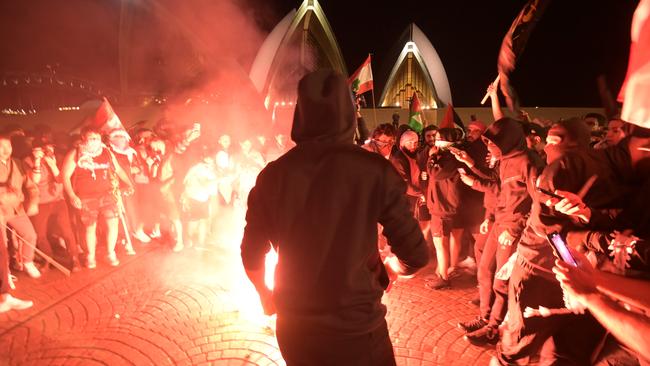
The Greens – while winning the support of many young people over their housing policy – are seen by many Australians as a renegade party operating outside the acceptable boundaries of politics. This guarantees a deeper polarisation in our politics seeded by ideological issues unlikely to dissipate easily or quickly.
The change in Labor attitudes towards Israel and the Middle East is unlikely to be reversed. It is underwritten by hostility towards Israel’s right-wing politics, the huge civilian casualties from its Gaza campaign, the importance of the Muslim vote across critical Labor seats and the extent of anti-Israel sentiment across nearly the entire left of politics including the Labor rank and file.
In a predictable move this week the Labor Party has rejected the Coalition-driven call for a judicial inquiry into anti-Semitism at Australian universities, proposing instead an investigation by a parliamentary joint committee. This follows a Senate committee inquiry into the initiative first advanced by Leeser.
“Labor has ignored the calls of Jewish students and staff,” Leeser said. “They have ignored the calls of every major Jewish organisation in the country and the recommendations of the special envoy to combat anti-Semitism who was recently appointed by the Albanese government.”
The envoy, Jillian Segal, in her submission to the committee, offered a chilling portrait of the prejudice on campuses: “Anti-Semitic behaviour is not only present on many campuses but is an embedded part of the culture. Universities have not taken appropriate action to denounce and suppress it. The Jewish students are traumatised and feel isolated and unsafe. They have been told by their university administration to stay home for their own safety.
“This normalised anti-Semitism is incredibly dangerous to our society as it is an attitude and behaviour that eats away at the fabric of the mission of the tertiary sector.” Segal said Australian universities had not displayed the same response as leading US universities and the situation on Australian campuses “must change”. Her submission was based on interviews with Jewish students who had “no confidence” in institutions that were supposed to help them, like the AHRC.
In supporting a judicial inquiry, Segal said testimonies and data showed “a truly alarming increase in anti-Semitic incidents and discourse” at universities particularly since October 7, the situation being “very grave and indeed much more serious and alarming than I expected”. She said Jewish students and academics would speak only to people such as her office or a judicial inquiry able to take evidence in private.
While supporting the judicial inquiry, Segal said it wasn’t enough. The “emotional and physical” safety of Jewish students demanded a series of repairs to be introduced “immediately”. Segal’s most devastating warning came from the anti-Semitic hatred being fanned by social media, saying: “If it is not countered at universities it could become so embedded as to never be able to be removed.”
But Leeser has told Inquirer there will be a judicial inquiry. “A judicial inquiry is now Coalition policy. It is going to happen – whether we win the next election or the one after that or the one after that. Vice-chancellors will be held to account for their actions or their failure to act.”
It is obvious many influential figures see anti-Semitism and the community polarisation on display as long-run challenge likely to last many years, with the protracted Israeli-Palestinian-Iranian conflict only guaranteed to operate as a poisonous catalyst. The December 2023 survey conducted by the Executive Council of Australian Jewry found anti-Semitic incidents in Australia increased 738 per cent in October-November 2023 compared with the same two months the previous year, evidence of the immediate domestic consequence of October 7 in Australia.
From the time of his Tom Hughes Oration in April, Dutton has intensified his attack, accusing Labor of a “moral fog” that tolerated anti-Semitism, refusing to hold perpetrators accountable and allowing Australia’s social contract to be damaged by people who have come to this country and “want Australia to change for them”.
Dutton attacked the repeated tolerance of the police over the past year, saying their job was not merely to keep the peace but to enforce the law and that was not happening. The police, in turn, say the laws aren’t sufficiently tight. “When people talk about ‘from the river to the sea’ they’re talking about exterminating an entire race of people,” Dutton said. “They don’t have any tolerance for people of Jewish faith. The schools at the moment with armed guards are not the Muslims schools, they’re Jewish schools.”
He said celebrating terrorism was “not consistent with Australian values” and “not consistent with the obligation that people undertook when they took out Australian citizenship”.
Yet neither Albanese nor Dutton has an answer to the polarisation in our society revealed by the Middle East crisis. The social and political rift will only intensify the longer the war continues. And this is guaranteed to become a growing problem for Labor in the run-up to the 2025 election. Meanwhile, the foundation of our multiculturalism – that people must not bring the conflicts from their ancestral past to this country – is being torn apart.
Leeser told Inquirer: “I think that October 7 rocked this country in a way that I never imagined we would be rocked. It is extraordinary to me that the values of my grandparents’ generation – that we support democracy, that we support the Western alliance, that we believe in the rule of law – that these values can be compromised and that we can so quickly abandon Israel and Jewish Australians when they come under threat.”


The one-year anniversary of the Hamas massacre of 1200 innocent Israelis amid brutal killings and sexual depravity has provoked massive Israeli retaliation, the killing of more than 40,000 Palestinians, several conflicts across the Middle East – and profound changes in Australia.